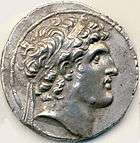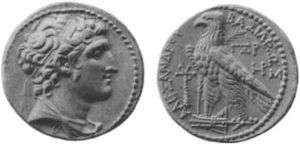Alexander Balas
| Alexander Balas | |
|---|---|
 | |
| King of the Seleucid Empire (King of Syria) | |
| Reign | 150–146 BC |
| Predecessor | Demetrius I Soter |
| Successors | Demetrius II Nicator or Antiochus VI Dionysus |
| Queen | Cleopatra Thea |
| Born | Smyrna |
| Died | 146 BC |
| Wife | Cleopatra Thea |
| Issue | Antiochus VI Dionysus (first son with Cleopatra Thea) |
| Dynasty | Seleucid |
| Father | Antiochus IV Epiphanes (unconfirmed) |
| Mother | Laodice IV (unconfirmed) |
Alexander Balas (Ancient Greek: Ἀλέξανδρoς Bάλας), ruler of the Greek Seleucid kingdom in 150–146 BC. Alexander defeated his brother Demetrius Soter for the crown in 150 BC. Ruling briefly, he lost the crown to his brother during his defeat at the battle of Antioch (145 BC) in Syria, dying shortly after.
Biography
Early life and reign

He was a native of Smyrna of humble origin, but gave himself out to be the son of Antiochus IV Epiphanes and Laodice IV and heir to the Seleucid throne. Along with his sister Laodice VI, the youngster Alexander was "discovered" by Heracleides, a former minister of Antiochus IV and brother of Timarchus, an usurper in Media who had been executed by the reigning king Demetrius I Soter.[1]
Alexander's claims were recognized by the Roman Senate, Ptolemy Philometor of Egypt and others. He married Cleopatra Thea, a daughter of the Ptolemaic dynasty. At first unsuccessful, Alexander finally defeated Demetrius Soter in 150 BC. Being now master of the empire, he is said to have abandoned himself to a life of debauchery. Whatever the truth behind this, the young king was forced to depend heavily on his Ptolemaic support and even struck portraits with the characteristic features of king Ptolemy I.
Final battle and death

Demetrius Soter's son Demetrius II profited by the opportunity to regain the throne. Ptolemy Philometor, who was Alexander's father-in-law, went over to his side, and Alexander was defeated in the battle of Antioch (145 BC) in Syria, sometimes known as the battle of the Oenoparus.
He fled for refuge to a Nabataean prince, who murdered him and sent his head to Ptolemy Philometor, who had been mortally wounded in the engagement.[2]
See also
Notes
- ↑ Smith, Philip Peter (1867). "Alexander Balas". In William Smith. Dictionary of Greek and Roman Biography and Mythology. 1. Boston: Little, Brown and Company. pp. 114–115.
- ↑
 This article incorporates text from a publication now in the public domain: Chisholm, Hugh, ed. (1911). "Alexander Balas". Encyclopædia Britannica. 1 (11th ed.). Cambridge University Press.
This article incorporates text from a publication now in the public domain: Chisholm, Hugh, ed. (1911). "Alexander Balas". Encyclopædia Britannica. 1 (11th ed.). Cambridge University Press.
References
 Maas, Anthony John (1907). "Alexander". In Herbermann, Charles. Catholic Encyclopedia. 1. New York: Robert Appleton Company.
Maas, Anthony John (1907). "Alexander". In Herbermann, Charles. Catholic Encyclopedia. 1. New York: Robert Appleton Company.
Further reading
- 1 Maccabees 10 ff.
- Justin xxxv. 1 and 2
- Josephus, Antiquities of the Jews (PACE: Antiquities of the Jews, 13.{{{chap}}}.{{{sec}}} (Whiston).)
- Appian, Syrian Wars (=Roman History book 11), 67
- Polybius, The Histories xxxiii. 14.
External links
| Wikimedia Commons has media related to Alexander Balas. |
- Alexander Balas, article in historical sourcebook by Mahlon H. Smith
| Alexander Balas Born: Unknown Died: 146 BC | ||
| Preceded by Demetrius I Soter |
Seleucid King (King of Syria) 150–146 BC |
Succeeded by Demetrius II Nicator or Antiochus VI Dionysus |